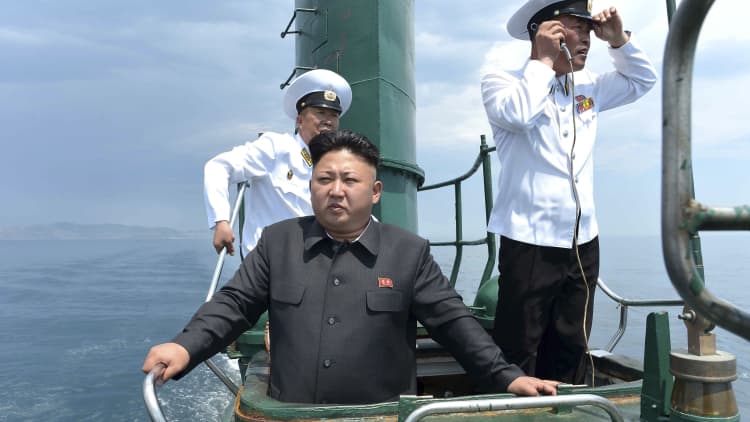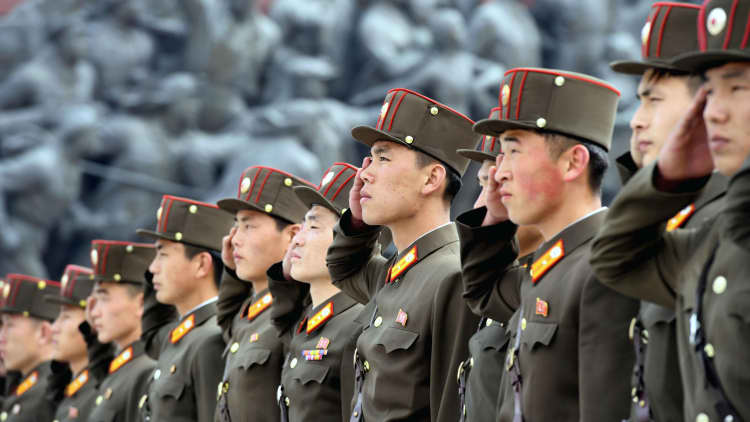
North Korea will continue its nuclear weapons and ballistic missile programs and the U.S. cannot count on China to apply sufficient pressure to deter the growing threat, experts told a Senate panel Tuesday.
Also, a U.S. military strike on Pyongyang would pose huge risks for the U.S., South Korea and other allies in the region, and the outlook for regime change is grim even if economic incentives were offered.
"The challenges emanating from North Korea are obviously real, dangerous and in the near term," Ashley Tellis, a senior fellow at the Carnegie Endowment for International Peace testified to at full Senate Armed Services Committee hearing about policy and strategy in the Asia-Pacific region.
Tellis added, "The challenges emanating from China are
The hearing came as tensions remained high on the Korean Peninsula as North Korea conducted artillery drills Tuesday, according to South Korea's Yonhap News Agency. It reported the Pyongyang regime "staged what appears to be the largest firing drill," which it said was to mark the 85th founding anniversary of communist state's military.
Meantime, experts said more could be done to apply economic pressure on North Korea but it would involve sanctioning Chinese entities, including banks.
"If we're going to be serious about this, we're probably going to have to go down that road," Aaron Friedberg, professor of politics and international affairs at Princeton University, testified.

China's economic ties with its neighbor North Korea are important to the secretive regime's survival but even with pressure, Pyongyang is unlikely to abandon its nuclear weapons program.
"Denuclearization is unlikely at this point — at least in the near term and at least under this regime," testified Kelly Magsamen, former principal deputy assistant secretary of Defense for Asian and Pacific security affairs.
The 33-year-old Kim Jong Un,
"We essentially have to prepare for a North Korean capability that will ultimately reach the United States," said Victor Cha, senior adviser and Korea chair at the Center for Strategic and International Studies. He said deterrence offers hope but "is dangerous because of the unpredictability of this regime."
At the same time, senators were told the U.S. needs to consider diplomacy as a solution to limit the North Korean threat but also must accelerate defensive options, including its regional missile defense systems with allies such as Japan and South Korea as well as the U.S. homeland itself. They indicated that more focus on defensive systems was a prudent strategy in case diplomacy fails with Pyongyang.
Yet the military option should remain on the table too, experts said. They said the U.S. could target missile launch facilities in North Korea or other key military installations but the possibility of eliminating all the nuclear locations is challenging at best.
"The nuclear targets themselves have become more numerous," said Princeton's Friedberg, who previously served as a deputy assistant for national security affairs in the office of Vice President Dick Cheney. "North Koreans are starting to develop mobile ballistic missiles. The problem with pre-empting or attacking in a preventative way and destroying the North Korean nuclear capabilities is only getting worse."
That said, experts also testified there's a very high risk with U.S. military action against North Korea because it could result in the Pyongyang regime launching a retaliatory strike with conventional weapons against South Korea and Japan as well as lead to Chinese military intervention on the Korean Peninsula.
"We should not kid ourselves here," said Magsamen. "A conflict on the peninsula would be unlike anything we have seen in decades. North Korea is not a Syria. It's not an Iraq. The consequences could be extremely high."
Furthermore, she added, "We are going to face a very stark choice at some point in the future – probably in the next five years about an ICBM reaching the United States."
Yonhap reported Tuesday that the firing drills involve as many as 400 long-range artillery pieces and added that they can reach Seoul and other nearby areas. The North's drills also come as the carrier strike group led by the USS Carl Vinson is expected to arrive in the region later this week and as a U.S. nuclear submarine docked in South Korea.
A spokesman for the U.S. Pacific Fleet Command told CNBC on Tuesday afternoon that the Vinson carrier strike group completed drills with Japan self-defense forces Monday and is currently conducting what he termed "routine strike group and air wing training in the Philippine Sea in waters south of Japan."
On Wednesday, there will be a White House briefing for all 100 senators regarding the North Korean situation by key Trump administration officials, including the secretaries of Defense and State as well as the director of national intelligence and chairman of the Joint Chiefs of Staff.
Correction: The carrier strike group is being led by the USS Carl Vinson. An earlier version misstated the name of the ship.


